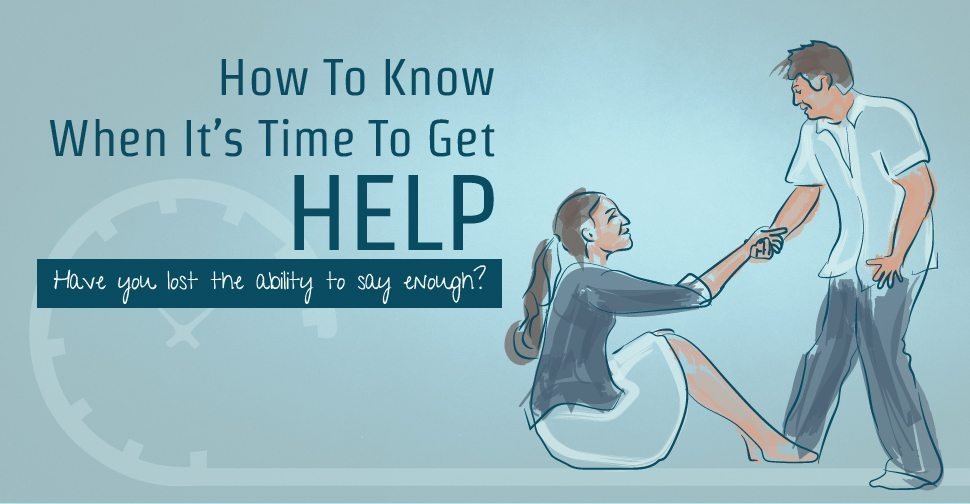How To Know When It’s Time To Get Help

Have you lost the ability to say enough?
My father-in-law, Jim, loves drag racing. I have to admit, they are fun events to watch. I also love going with him to a race, because he knows all the ins and outs: the displacements of the different engines, what fuel a vehicle uses, and when the best time to shift is.
Of course, like any race, it’s also fun watching the crashes and the explosions. I’ll admit I’ve had my fair share of schadenfreude witnessing a thrown rod or a spinout. I always hope the driver is all right; the pleasure I derive from the racer’s misfortune stops at the guy’s well-being.
One thing I know for sure—I would make a crappy drag racer.
I have zero doubt that I’d either blow up the engine or I’d spin out, sliding into a wall and kill myself.
I know this, because I know my brain. Under the influence of intense stimulation, it screams just one word: MORE!!
I’m an adrenaline junky. Anything that pushes the stimulation and the experience of “the now” to its extremes is what I’m after.
For me, drugs and alcohol provided that experience.
When I speak publicly, one of the questions I often get from normies (people who don’t drink alcoholically or don’t OD on drugs) is why I didn’t simply cut back on my usage or quit on my own. I’ve had to listen patiently and closely to them to understand that they don’t understand.
I like to get high.
And it isn’t just that. I also like to get really, really high. After that first drink or the first warm embrace of opiate bliss, I like it, but there’s something else. The need to want more stifles any rational thought to slow down or stop.
If you’re reading and you can relate to this experience, it’s probably a good sign that our brains are wired similarly. There are other signs that you need to know as well. However, any indication that you might be an alcoholic or an addict in need of recovery all point back to the basic need to push yourself beyond the edges of what our minds or bodies are capable of.
Keeping the point I made above in mind, here is a list of other signs and symptoms to look for:
You can’t remember the previous evening’s events
Anterograde amnesia is the inability to make long-term memories after the event that caused it. Benzodiazepines—like Xanax or Lorazepam—and alcohol are frequently culprits of this condition. With drinking, it commonly happens after someone else suggests you have had enough. Or, if you’re a lone drinker like I was, you keep chasing the ultimate high and drink to the point where you black out.
Let me be clear: normal people don’t do this. Especially multiple times.
If you’re blacking out when you drink it means that enough ethanol has gotten into your system so that your brain’s ability to make new memories isn’t working correctly. Blacking out is directly correlated with the amount of alcohol that’s in your system.
With benzos, the formula is a bit trickier. The capacity for those drugs to cause blackouts is well-documented. However, every person will experience different dosage limits before the amnesia occurs. If you mix benzos and alcohol together, it’s more likely to happen, but mixing those drugs is playing Russian roulette to begin with. That mixture was what proved deadly for Whitney Houston.
Your use begins to affect your job and relationships
Despite any belief that the rest of the world is screwed up (and that you’re just fine), alcohol or drugs make you a lousy employee and their abuse destroys relationships.
Once again, the drive to hit the bottle harder and faster (or to score a bigger load) sets a firm foundation for you to build your flimsy house of cards. TheI inevitably pushes the addict or alcoholic over the edge. Missed appointments, embarrassing behavior, shouting matches with your spouse, loss of morality, or the intervention of the law are usually the consequences quick to follow.
With different people, these consequences may come at different times, but come they will. Because alcohol and other drugs directly affect the brain, varied and often unpredictable behavior will happen. It’s not a matter of if, but when.
Add in the effects of withdrawal, and then the affected person has completely lost the will to choose. It’s hard enough going to work hung over. If you need to drink to steady your quivering hands, you probably need help to return to normal function.
You have tried to control your use, but failed
It started out as fun. Drinking or getting high was a great way to relax, to party. Drugs or alcohol did something positive for you. Non-addicts don’t seem to understand this point—we used the chemicals because they worked.
It would be really great if they kept working. It would be super if they didn’t muck up our lives. But they don’t keep working. And they do destroy the lives we once had.
Maybe you’ve come to the realization that you need to cut back. So, you give it a shot.
I tried this multiple times. At first, it seemed to work. This isn’t so hard, I said.
But then one morning I’d wake up with my face in my own vomit, completely perplexed by how I had gotten back to the point where I decided to change. Then it gets worse. Addiction is a progressive illness, after all.
Substance Use Disorders, depending on the level of severity and the chemical used, all have one thing in common: despite negative, ongoing consequences, the subject continues in the negative behaviors that got him or her there in the first place.
It is insanity, an induced mental illness. The only solution is to seek help.
Addicts and alcoholics are pedal-to-the-metal drag racers. We have lost the ability to say enough. It’s likely that many didn’t have that ability to begin with.
There is hope. Millions of people worldwide have gained their lives back.
A good point to keep in mind is that there was a time before you drank or used the way you do now. If the points I made in this article resonate in your life, maybe it’s time to get help.
There is plenty of help out there—all you have to do is ask.
Daniel D. Maurer is a freelance writer openly living in long-term recovery. He is the author of Sobriety: A Graphic Novel, a Hazelden Publishing youth and young adult resource. He lives with his family in Saint Paul, Minnesota.



 Resources about addiction and recovery
Resources about addiction and recovery
